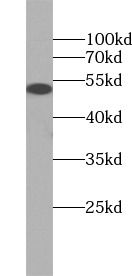Products
- SPECIFICATIONS
- CITATIONS
- FIGURES
- CONDITIONS
- FAQS
- Product Name
- TP53 antibody
- Catalogue No.
- FNab06083
- Size
- 100μg
- Form
- liquid
- Purification
- Immunogen affinity purified
- Purity
- ≥95% as determined by SDS-PAGE
- Clonality
- polyclonal
- Isotype
- IgG
- Storage
- PBS with 0.02% sodium azide and 50% glycerol pH 7.3, -20℃ for 12 months (Avoid repeated freeze / thaw cycles.)
- Immunogen
- tumor protein p53
- Alternative Names
- Cellular tumor antigen p53|Antigen NY-CO-13|Phosphoprotein p53|Tumor suppressor p53|TP53|P53 antibody
- UniProt ID
- P04637
- Observed MW
- 53 kDa
- Tested Applications
- ELISA, WB, IHC, IF
- Recommended dilution
- WB: 1:500 - 1:2000; IHC: 1:50 - 1:200; IF: 1:20 - 1:100
 MCF7 cells were subjected to SDS PAGE followed by western blot with FNab06083(P53 antibody) at dilution of 1:1000
MCF7 cells were subjected to SDS PAGE followed by western blot with FNab06083(P53 antibody) at dilution of 1:1000
 Immunohistochemistry of paraffin-embedded human endometrial cancer using FNab06083(P53 antibody) at dilution of 1:100
Immunohistochemistry of paraffin-embedded human endometrial cancer using FNab06083(P53 antibody) at dilution of 1:100
 Immunofluorescent analysis of HepG2 cells using FNab06083 (P53 Antibody) at dilution of 1:50 and Alexa Fluor 488-conjugated Goat Anti-Rabbit IgG (H+L)
Immunofluorescent analysis of HepG2 cells using FNab06083 (P53 Antibody) at dilution of 1:50 and Alexa Fluor 488-conjugated Goat Anti-Rabbit IgG (H+L)
- Background
- This gene encodes a tumor suppressor protein containing transcriptional activation, DNA binding, and oligomerization domains. The encoded protein responds to diverse cellular stresses to regulate expression of target genes, thereby inducing cell cycle arrest, apoptosis, senescence, DNA repair, or changes in metabolism. Mutations in this gene are associated with a variety of human cancers, including hereditary cancers such as Li-Fraumeni syndrome. Alternative splicing of this gene and the use of alternate promoters result in multiple transcript variants and isoforms. Additional isoforms have also been shown to result from the use of alternate translation initiation codons from identical transcript variants (PMIDs: 12032546, 20937277).
- Journal:
- Cell Communication and Signaling
- Author:
- Department of Engineering for Innovation Medicine and School of Medicine in Sports and Exercise, University of Verona and Azienda Ospedaliera Universitaria Integrata of Verona, Verona, 37134, Italy.
- Cited Date:
- 2025-12-26
- Product:
- Journal:
- International Journal of Biological Macromolecules
- Author:
- College of Basic Medical Sciences, Jilin University, Changchun 130021, China; School of Pharmaceutical Sciences, Jilin University, Changchun 130021, China.
- Cited Date:
- 2025-03-14
- Product:
- Journal:
- Antioxidants
- Author:
- Department of Engineering for the Innovation Medicine, University of Verona, 37100 Verona, Italy.
- Cited Date:
- 2025-11-28
- Product:
- Journal:
- Journal of Sol-Gel Science and Technology
- Author:
- Faculty of Pharmacy and Health Sciences, Royal College of Medicine Perak, Universiti Kuala Lumpur, Ipoh, Perak, Malaysia
- Cited Date:
- 2025-10-11
- Product:
- Journal:
- Iraqi Journal of Veterinary Sciences
- Cited Date:
- 2021-09-24
- Product:
- Journal:
- Veterinary World
- Cited Date:
- 2022-01-14
- Product:
How many times can antibodies be recycled?
First, usually it's not suggested to recycle antibodies. After use, buffer system of antibodies has changed. The storage condition of recycled antibodies for different customers also varies. Thus, the performance efficiency of recycled antibodies can’t be guaranteed. Besides, FineTest ever conducted the antibody recycling assay. Assay results show recycling times of different antibodies also varies. Usually, higher antibody titer allows more repeated use. Customers can determine based on experimental requirements.
Notes: After incubation, we recycle rest antibodies to centrifuge tube and store at 4℃. High titer antibodies can be stored for a minimum of one week. Reuse about three times.
What are components of FineTest antibody buffer?
Components of FineTest antibody buffer are usually PBS with proclin300 or sodium azide, BSA, 50% glycerol. Common preservative is proclin300 or sodium azide, which is widely applied in the lab and industry.
How about the storage temperature and duration of FineTest antibodies?
Most antibodies are stored at -20℃. Directly-labeled flow cytometry antibodies should be stored at 2 - 8℃. The shelf life is one year. If after sales issues for purchased antibodies appear, return or replacement is available. Usually, antibodies can be still used after the one-year warranty. We can offer technical support services.
Is dilution required for FineTest antibodies? What’s the dilute solution?
Directly-labeled flow cytometry antibodies are ready-to-use without dilution. Other antibodies are usually concentrated. Follow the dilution ratio suggested in the manual. Dilute solution for different experiments also varies. Common antibody dilution buffers are acceptable(e.g. PBST, TBST, antibody blocking buffer).
How to retrieve antibodies for immunohistochemistry?
Common retrieval buffers: Tris-EDTA Buffer(pH 9.0); Citrate Buffer(pH 6.0)
Heat induced antibody retrieval:
Method 1: Water-bath heating: Put the beaker with retrieval buffer and slide in the boiling water bath. Keep the boiling state for 15min. Naturally cool to room temperature;
Method 2: Microwave retrieval: Put the beaker with retrieval buffer and slide in the microwave oven. Heat at high power for 5min, Switch OFF for 3min, Heat at medium power for 5min. Naturally cool to room temperature.
How to choose secondary antibodies?
(1) Secondary antibodies react with primary antibodies. Thus, secondary antibodies should be against host species of primary antibodies. E.g. If the primary antibody is derived from rabbit, the relevant secondary antibody should be against rabbit. E.g. goat anti rabbit or donkey anti rabbit.
(2) Choose secondary antibody conjugates according to the experimental type, e.g. ELISA, WB, IHC etc. Common enzyme conjugated secondary antibodies are labelled by HRP, AP etc. Fluorescin or dye labelled secondary antibodies are applied in immunofluorescence and flow cytometry(e.g. FITC, Cy3).
